-
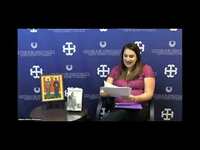 Julianne E. Wallace - Of Messengers of Peace: A Liturgy for Our World in the Voices of Merton and Francis. Presented for the Tuesdays with Merton Series, October 11, 2022.
Julianne E. Wallace - Of Messengers of Peace: A Liturgy for Our World in the Voices of Merton and Francis. Presented for the Tuesdays with Merton Series, October 11, 2022. The October 2022 Tuesdays with Merton presentation celebrated a liturgy for peace. This service, integrating music, readings, poetry, and reflections from the wisdom of Thomas Merton and St. Francis of Assisi, provided a moment of reflection during times where peace often seems just out of reach.
Dr. Julianne E. Wallace is Vice President for Mission at Saint Mary’s College in Notre Dame, Indiana. She holds a Doctor of Ministry in Educational Leadership from Virginia Theological Seminary, a Master of Theological Studies in Word and Worship from Washington Theological Union, and a bachelor’s in Music Performance from the University of Mary Washington. She has been active in Franciscan higher education for almost twelve years, most recently as Vice President for Mission and Ministry at Alvernia University. She served as Associate Director of Faith Formation, Worship, and Ministry at St. Bonaventure University in New York. She has been an active ITMS member since 2015, site-coordinator for the 2017 Annual Meeting and coordinating the liturgical life at many other ITMS conferences.
-
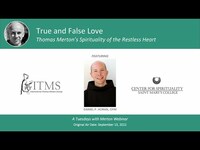 Daniel P. Horan, OFM - True and False Love: Thomas Merton's Spirituality of the Restless. Presented for the Tuesdays with Merton Series, September 13, 2022.
Daniel P. Horan, OFM - True and False Love: Thomas Merton's Spirituality of the Restless. Presented for the Tuesdays with Merton Series, September 13, 2022. Saint Augustine famously wrote that, "You have made us for yourself, O Lord, and our hearts are restless until they rest in you." This summarizes well what we might call a spirituality of divine love and the human longing for relationship. This Tuesdays with Merton presentation explores Thomas Merton's own contributions toward developing a spirituality of love, which surfaces as a recurring theme in his writing from his earliest journal entries and books until his untimely death. Drawing on Merton's wisdom, we may come to better distinguish for ourselves between 'true' and 'false' love in our own lives and spiritual journeys.
Daniel P. Horan, OFM, is Professor of Philosophy, Religious Studies and Theology and Director of the Center for Spirituality at Saint Mary’s College in Notre Dame, Indiana. He previously held the Dun Scotus Chair of Spirituality at Catholic Theological Union in Chicago. A columnist for the National Catholic Reporter, he is the author of fourteen books, including The Franciscan Heart of Thomas Merton: A New Look at the Spiritual Inspiration of His Life, Thought, and Writing, Catholicity and Emerging Personhood: A Contemporary Theological Anthropology, and his two latest are titled A White Catholic’s Guide to Racism and Privilege and The Way of the Franciscans: A Prayer Journey Through Lent. He also recently co-edited the book The Human in a Dehumanizing World: Reexamining Theological Anthropology and Its Implications. He is co-host of The Francis Effect Podcast.
-
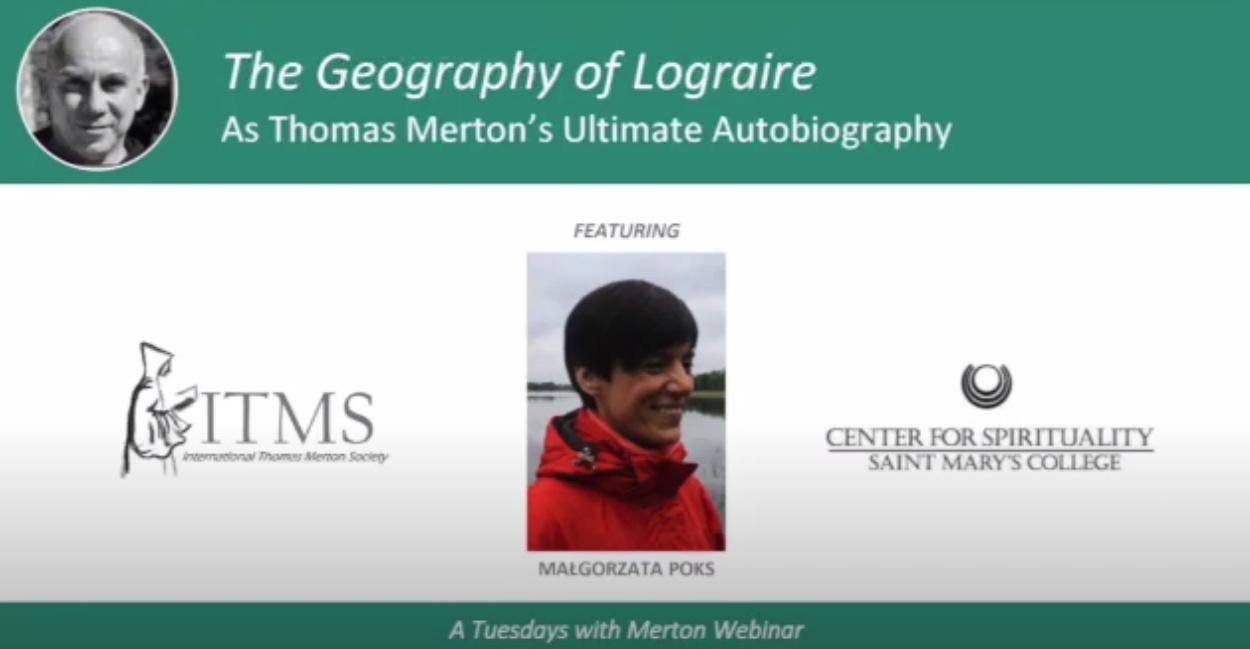 Malgorzata Poks - The Geography of Lograire as Thomas Merton’s Ultimate Autobiography. Presented for the Tuesdays with Merton Series, June 14, 2022.
Malgorzata Poks - The Geography of Lograire as Thomas Merton’s Ultimate Autobiography. Presented for the Tuesdays with Merton Series, June 14, 2022. Thomas Merton’s famous autobiography The Seven Storey Mountain (1948) was the product of a young mind devastated by ambivalence and thirsting for certainty. Twenty years after its publication Merton felt dissatisfied with that book’s moral rigidity and finality of opinions, with his evasions and half-conscious posturing. The Geography of Lograire (1969), his mature autobiography, enacts the master theme of Merton’s writing—the search for the authentic self—as a constant process of self-invention and renegotiation of cultural codes. In my presentation I will attempt an autoethnographic reading of The Geography of Lograire.
Dr. Malgorzata Poks is an assistant professor at the Institute of Literary Studies, Faculty of Humanities, at the University of Silesia in Katowice, Poland. Her monograph Thomas Merton and Latin America: A Consonance of Voices (2006) received the International Thomas Merton Award, and her article “Home on the Border: In Ana Castillo's The Guardians” was awarded the 2019 Javier Coy Biennial Research Award. Recently she translated into Polish Linda Hogan’s native memoir The Woman Who Watches Over the World and finished writing Decolonial Animal Ethics in Linda Hogan’s Poetry and Prose.
-
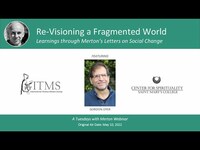 Gordon Oyer - Re-Visioning a Fragmented World: Learnings through Merton’s Letters on Social Change. Presented for the Tuesdays with Merton Series, May 10, 2022.
Gordon Oyer - Re-Visioning a Fragmented World: Learnings through Merton’s Letters on Social Change. Presented for the Tuesdays with Merton Series, May 10, 2022. Beyond his prolific publications, we know Thomas Merton for his vast, diverse readings and massive output of correspondence. This session explores perspectives on peace, race, and ecology that Merton shared in his apostolate of letters. It connects these views with reading materials that informed his thought and helped address his recipients’ immediate concerns about those social dilemmas. It also highlights how his responses spoke beyond their immediate context and, as Daniel Berrigan stated, timelessly “unmasked the spiritual forces which lie under the appearances of things” and remain at play in our own time.
Gordon Oyer is the author of Signs of Hope: Thomas Merton’s Letters on Peace, Race, and Ecology and Pursuing the Spiritual Roots of Protest, which reconstructs Thomas Merton’s 1964 retreat for peace activists. Over the past decade he has presented papers at several ITMS and Thomas Merton Society of Great Britain and Ireland conferences, and he has published articles in The Merton Annual and The Merton Journal as well as book reviews for The Merton Seasonal. Oyer received his MA in history from the University of Illinois—Urbana-Champaign. He currently resides in Louisville, KY.
-
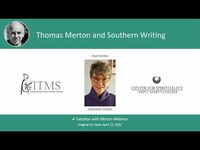 Deborah Kehoe - Thomas Merton and Southern Writing. Presented for the Tuesdays with Merton Series, April 12, 2022.
Deborah Kehoe - Thomas Merton and Southern Writing. Presented for the Tuesdays with Merton Series, April 12, 2022. Thomas Merton’s appreciation for the work of notable literary artists of the southern United States and Global South is well-documented throughout his writing. Using the broadest of criteria, Merton, by virtue of having found his only stable earthly home in the hills of Kentucky, can also be identified as a “southern writer,” in whose works evidence of a deep affinity with the voices of the expansive South can be heard. In this talk, I hope to explore some of the classical and contemporary particulars as well as the implications of a poetic and spiritual connection between Merton and other writers of a compelling, enigmatic body of literature.
Dr. Deborah Kehoe is a lifelong resident of Mississippi, born and raised in Jackson, now living in Oxford. She took a PhD in English with a concentration in twentieth-century literature from the University of Mississippi and is retired from a decades-long career of teaching rhetoric and literature in the red clay hills of her native state. She is a former member of the ITMS Board of Directors and current co-editor of The Merton Annual.
-
 Gregory K. Hillis - What Does Thomas Merton Have to Tell Us About Catholic Identity? Presented for the Tuesdays with Merton Series, March 8, 2022.
Gregory K. Hillis - What Does Thomas Merton Have to Tell Us About Catholic Identity? Presented for the Tuesdays with Merton Series, March 8, 2022. Since His Death in 1968, Merton’s Catholic identity has been regularly questioned, both by those who doubt the authenticity of his Catholicism given his commitment to ecumenical and interreligious dialogue and by those who admire Merton because they see him as an aberration who rebelled against his Catholicism. In my presentation, I want to talk about how thoroughly immersed Merton was in his Catholic identity and to explore what we can learn today about what he can teach us about a Catholicism simultaneously rooted in tradition and open to the world and to others.
Dr. Gregory K. Hillis is Professor of Theology & Religious Studies at Bellarmine University in Louisville, Ky. His doctoral research was on early Christian theology, with a particular focus on St. Cyril of Alexandria. In the last few years he has turned his attention to the life and writings of Thomas Merton. He teaches a popular undergraduate course on Merton and has delivered lectures around the United States on Merton’s theology. He has written both academic and popular articles on Merton’s life and authored the recent book Man of Dialogue: Thomas Merton’s Catholic Identity (Liturgical Press, 2021).
-
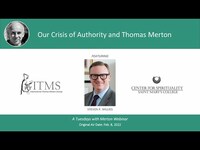 Steven P. Millies - Our Crisis of Authority and Thomas Merton. Presented for the Tuesdays with Merton Series, February 8, 2022.
Steven P. Millies - Our Crisis of Authority and Thomas Merton. Presented for the Tuesdays with Merton Series, February 8, 2022. The Polarizing Conflicts that divide the Catholic Church and social life are widely recognized but poorly understood. Thomas Merton understood what we face as a crisis of authority that has far-flung implications and whose fullest dimensions have come into view only in decades since he died. We will explore the crisis of authority as we now experience it in 2022, and we will look to Merton for wisdom about how we can resolve the crisis.
Steven P. Millies is professor of public theology and director of The Bernardin Center at Catholic Theological Union in Chicago. His most recent book is Good Intentions: A History of Catholic Voters’ Road from Roe to Trump (Liturgical Press, 2018).
-
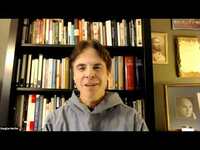 Doug Hertler - Merton, You, and Me: The Reality of Life in the Paschal Mystery. Presented for the Tuesdays with Merton Series, January 11, 2022.
Doug Hertler - Merton, You, and Me: The Reality of Life in the Paschal Mystery. Presented for the Tuesdays with Merton Series, January 11, 2022. Surrounded by suffering and death, we believe in redemption and new life. Besieged by every form of war, we hope for peace and the coming of God’s Kingdom. Where is war present in your life? Is it only experienced “out there,” or can it be found “in here” as well? Have you identified an enemy to destroy? Are you sure that enemy is not yourself? Excerpts from Doug’s play “Merton and Me – A Living Trinity” and these words of Thomas Merton will guide our reflection: “Life and death are at war within us. As soon as we are born, we begin at the same time to live and die.”
Douglas Hertler (aka Doug Lory) is a professional actor, playwright, retreat leader, and NYC tour guide. He also works at Fordham University School of Law as an actor/educator. His one-man play “Merton and Me – A Living Trinity” debuted in the fall of 2018 for the Corpus Christi Chapter of the ITMS. Doug spent the month of January 2020 living with the Trappist community of Mepkin Abbey as a monastic guest and will be performing his show there in February. He also serves on the board of the American Teilhard Association. His website is www.mertonandme.com.
-
 Paul M. Pearson - "I love beer, and, by that very fact, the world": The humor (and humanity) of Thomas Merton. Presented for the Tuesdays with Merton Series, December 14, 2021.
Paul M. Pearson - "I love beer, and, by that very fact, the world": The humor (and humanity) of Thomas Merton. Presented for the Tuesdays with Merton Series, December 14, 2021. Over the years many of Thomas Merton’s visitors and friends commented on his sense of humour. With the seriousness of his writings this humour can all too easily be overlooked. This presentation will explore Merton’s sense of humour from his pre-monastic cartoons, through his correspondence, journal entries and recordings, to the stories told by his friends and brothers. Merton’s sense of humor was a way for him to critique the world, humorously warning readers of our propensity to “wear our mitres even to bed” and reminding them of his own need for beer!
Paul M. Pearson is Director of the Thomas Merton Center at Bellarmine University in Louisville, Kentucky and Chief of Research for the Merton Legacy Trust. He is Resident Secretary of the International Thomas Merton Society and served as President for the 10th administration. Paul is a founding member of the Thomas Merton Society of Great Britain and Ireland. He edited Seeking Paradise: Thomas Merton and the Shakers, A Meeting of Angels: The Correspondence of Thomas Merton with Edward Deming and Faith Andrews, Thomas Merton on Christian Contemplation and, most recently, Beholding Paradise: The Photographs of Thomas Merton.
-
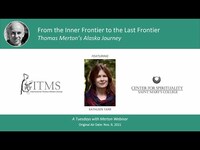 Kathleen Tarr - From the Inner Frontier to the Last Frontier: Thomas Merton's Alaska Journey. Presented for the Tuesdays with Merton Series, November 9, 2021.
Kathleen Tarr - From the Inner Frontier to the Last Frontier: Thomas Merton's Alaska Journey. Presented for the Tuesdays with Merton Series, November 9, 2021. Thomas Merton's journey to Alaska, a sojourn of seventeen days, has been rendered mostly as a "blip" within his remarkable biography. Yet the mysterious frontier suddenly surfaced to captivate him. Though short in duration, Merton's experience of the vast terrain, along with the talks he gave, were profound in spiritual insights. This presentation will explore that untold story, along with visual images of the places Merton experienced and photographic images taken by Merton himself.
Kathleen Tarr, longtime Alaskan, lives and writes under the Chugach Mountains in Anchorage. She is the founder of the Alaska Chapter of the ITMS and author of We Are All Poets Here: Thomas Merton’s Journey to Alaska – A Shared Story about Spiritual Seeking (2018). Her essays have appeared in We Are Already One: Thomas Merton’s Message of Hope (2015) and Merton & Indigenous Wisdom (2019). She is a member of the ITMS board of directors, PEN America, and the Alaska Historical Society. She draws inspiration from contemplating the spiritual geography of mountains.
 Julianne E. Wallace - Of Messengers of Peace: A Liturgy for Our World in the Voices of Merton and Francis. Presented for the Tuesdays with Merton Series, October 11, 2022. The October 2022 Tuesdays with Merton presentation celebrated a liturgy for peace. This service, integrating music, readings, poetry, and reflections from the wisdom of Thomas Merton and St. Francis of Assisi, provided a moment of reflection during times where peace often seems just out of reach. Dr. Julianne E. Wallace is Vice President for Mission at Saint Mary’s College in Notre Dame, Indiana. She holds a Doctor of Ministry in Educational Leadership from Virginia Theological Seminary, a Master of Theological Studies in Word and Worship from Washington Theological Union, and a bachelor’s in Music Performance from the University of Mary Washington. She has been active in Franciscan higher education for almost twelve years, most recently as Vice President for Mission and Ministry at Alvernia University. She served as Associate Director of Faith Formation, Worship, and Ministry at St. Bonaventure University in New York. She has been an active ITMS member since 2015, site-coordinator for the 2017 Annual Meeting and coordinating the liturgical life at many other ITMS conferences.
Julianne E. Wallace - Of Messengers of Peace: A Liturgy for Our World in the Voices of Merton and Francis. Presented for the Tuesdays with Merton Series, October 11, 2022. The October 2022 Tuesdays with Merton presentation celebrated a liturgy for peace. This service, integrating music, readings, poetry, and reflections from the wisdom of Thomas Merton and St. Francis of Assisi, provided a moment of reflection during times where peace often seems just out of reach. Dr. Julianne E. Wallace is Vice President for Mission at Saint Mary’s College in Notre Dame, Indiana. She holds a Doctor of Ministry in Educational Leadership from Virginia Theological Seminary, a Master of Theological Studies in Word and Worship from Washington Theological Union, and a bachelor’s in Music Performance from the University of Mary Washington. She has been active in Franciscan higher education for almost twelve years, most recently as Vice President for Mission and Ministry at Alvernia University. She served as Associate Director of Faith Formation, Worship, and Ministry at St. Bonaventure University in New York. She has been an active ITMS member since 2015, site-coordinator for the 2017 Annual Meeting and coordinating the liturgical life at many other ITMS conferences. Daniel P. Horan, OFM - True and False Love: Thomas Merton's Spirituality of the Restless. Presented for the Tuesdays with Merton Series, September 13, 2022. Saint Augustine famously wrote that, "You have made us for yourself, O Lord, and our hearts are restless until they rest in you." This summarizes well what we might call a spirituality of divine love and the human longing for relationship. This Tuesdays with Merton presentation explores Thomas Merton's own contributions toward developing a spirituality of love, which surfaces as a recurring theme in his writing from his earliest journal entries and books until his untimely death. Drawing on Merton's wisdom, we may come to better distinguish for ourselves between 'true' and 'false' love in our own lives and spiritual journeys. Daniel P. Horan, OFM, is Professor of Philosophy, Religious Studies and Theology and Director of the Center for Spirituality at Saint Mary’s College in Notre Dame, Indiana. He previously held the Dun Scotus Chair of Spirituality at Catholic Theological Union in Chicago. A columnist for the National Catholic Reporter, he is the author of fourteen books, including The Franciscan Heart of Thomas Merton: A New Look at the Spiritual Inspiration of His Life, Thought, and Writing, Catholicity and Emerging Personhood: A Contemporary Theological Anthropology, and his two latest are titled A White Catholic’s Guide to Racism and Privilege and The Way of the Franciscans: A Prayer Journey Through Lent. He also recently co-edited the book The Human in a Dehumanizing World: Reexamining Theological Anthropology and Its Implications. He is co-host of The Francis Effect Podcast.
Daniel P. Horan, OFM - True and False Love: Thomas Merton's Spirituality of the Restless. Presented for the Tuesdays with Merton Series, September 13, 2022. Saint Augustine famously wrote that, "You have made us for yourself, O Lord, and our hearts are restless until they rest in you." This summarizes well what we might call a spirituality of divine love and the human longing for relationship. This Tuesdays with Merton presentation explores Thomas Merton's own contributions toward developing a spirituality of love, which surfaces as a recurring theme in his writing from his earliest journal entries and books until his untimely death. Drawing on Merton's wisdom, we may come to better distinguish for ourselves between 'true' and 'false' love in our own lives and spiritual journeys. Daniel P. Horan, OFM, is Professor of Philosophy, Religious Studies and Theology and Director of the Center for Spirituality at Saint Mary’s College in Notre Dame, Indiana. He previously held the Dun Scotus Chair of Spirituality at Catholic Theological Union in Chicago. A columnist for the National Catholic Reporter, he is the author of fourteen books, including The Franciscan Heart of Thomas Merton: A New Look at the Spiritual Inspiration of His Life, Thought, and Writing, Catholicity and Emerging Personhood: A Contemporary Theological Anthropology, and his two latest are titled A White Catholic’s Guide to Racism and Privilege and The Way of the Franciscans: A Prayer Journey Through Lent. He also recently co-edited the book The Human in a Dehumanizing World: Reexamining Theological Anthropology and Its Implications. He is co-host of The Francis Effect Podcast. Malgorzata Poks - The Geography of Lograire as Thomas Merton’s Ultimate Autobiography. Presented for the Tuesdays with Merton Series, June 14, 2022. Thomas Merton’s famous autobiography The Seven Storey Mountain (1948) was the product of a young mind devastated by ambivalence and thirsting for certainty. Twenty years after its publication Merton felt dissatisfied with that book’s moral rigidity and finality of opinions, with his evasions and half-conscious posturing. The Geography of Lograire (1969), his mature autobiography, enacts the master theme of Merton’s writing—the search for the authentic self—as a constant process of self-invention and renegotiation of cultural codes. In my presentation I will attempt an autoethnographic reading of The Geography of Lograire. Dr. Malgorzata Poks is an assistant professor at the Institute of Literary Studies, Faculty of Humanities, at the University of Silesia in Katowice, Poland. Her monograph Thomas Merton and Latin America: A Consonance of Voices (2006) received the International Thomas Merton Award, and her article “Home on the Border: In Ana Castillo's The Guardians” was awarded the 2019 Javier Coy Biennial Research Award. Recently she translated into Polish Linda Hogan’s native memoir The Woman Who Watches Over the World and finished writing Decolonial Animal Ethics in Linda Hogan’s Poetry and Prose.
Malgorzata Poks - The Geography of Lograire as Thomas Merton’s Ultimate Autobiography. Presented for the Tuesdays with Merton Series, June 14, 2022. Thomas Merton’s famous autobiography The Seven Storey Mountain (1948) was the product of a young mind devastated by ambivalence and thirsting for certainty. Twenty years after its publication Merton felt dissatisfied with that book’s moral rigidity and finality of opinions, with his evasions and half-conscious posturing. The Geography of Lograire (1969), his mature autobiography, enacts the master theme of Merton’s writing—the search for the authentic self—as a constant process of self-invention and renegotiation of cultural codes. In my presentation I will attempt an autoethnographic reading of The Geography of Lograire. Dr. Malgorzata Poks is an assistant professor at the Institute of Literary Studies, Faculty of Humanities, at the University of Silesia in Katowice, Poland. Her monograph Thomas Merton and Latin America: A Consonance of Voices (2006) received the International Thomas Merton Award, and her article “Home on the Border: In Ana Castillo's The Guardians” was awarded the 2019 Javier Coy Biennial Research Award. Recently she translated into Polish Linda Hogan’s native memoir The Woman Who Watches Over the World and finished writing Decolonial Animal Ethics in Linda Hogan’s Poetry and Prose. Gordon Oyer - Re-Visioning a Fragmented World: Learnings through Merton’s Letters on Social Change. Presented for the Tuesdays with Merton Series, May 10, 2022. Beyond his prolific publications, we know Thomas Merton for his vast, diverse readings and massive output of correspondence. This session explores perspectives on peace, race, and ecology that Merton shared in his apostolate of letters. It connects these views with reading materials that informed his thought and helped address his recipients’ immediate concerns about those social dilemmas. It also highlights how his responses spoke beyond their immediate context and, as Daniel Berrigan stated, timelessly “unmasked the spiritual forces which lie under the appearances of things” and remain at play in our own time. Gordon Oyer is the author of Signs of Hope: Thomas Merton’s Letters on Peace, Race, and Ecology and Pursuing the Spiritual Roots of Protest, which reconstructs Thomas Merton’s 1964 retreat for peace activists. Over the past decade he has presented papers at several ITMS and Thomas Merton Society of Great Britain and Ireland conferences, and he has published articles in The Merton Annual and The Merton Journal as well as book reviews for The Merton Seasonal. Oyer received his MA in history from the University of Illinois—Urbana-Champaign. He currently resides in Louisville, KY.
Gordon Oyer - Re-Visioning a Fragmented World: Learnings through Merton’s Letters on Social Change. Presented for the Tuesdays with Merton Series, May 10, 2022. Beyond his prolific publications, we know Thomas Merton for his vast, diverse readings and massive output of correspondence. This session explores perspectives on peace, race, and ecology that Merton shared in his apostolate of letters. It connects these views with reading materials that informed his thought and helped address his recipients’ immediate concerns about those social dilemmas. It also highlights how his responses spoke beyond their immediate context and, as Daniel Berrigan stated, timelessly “unmasked the spiritual forces which lie under the appearances of things” and remain at play in our own time. Gordon Oyer is the author of Signs of Hope: Thomas Merton’s Letters on Peace, Race, and Ecology and Pursuing the Spiritual Roots of Protest, which reconstructs Thomas Merton’s 1964 retreat for peace activists. Over the past decade he has presented papers at several ITMS and Thomas Merton Society of Great Britain and Ireland conferences, and he has published articles in The Merton Annual and The Merton Journal as well as book reviews for The Merton Seasonal. Oyer received his MA in history from the University of Illinois—Urbana-Champaign. He currently resides in Louisville, KY. Deborah Kehoe - Thomas Merton and Southern Writing. Presented for the Tuesdays with Merton Series, April 12, 2022. Thomas Merton’s appreciation for the work of notable literary artists of the southern United States and Global South is well-documented throughout his writing. Using the broadest of criteria, Merton, by virtue of having found his only stable earthly home in the hills of Kentucky, can also be identified as a “southern writer,” in whose works evidence of a deep affinity with the voices of the expansive South can be heard. In this talk, I hope to explore some of the classical and contemporary particulars as well as the implications of a poetic and spiritual connection between Merton and other writers of a compelling, enigmatic body of literature. Dr. Deborah Kehoe is a lifelong resident of Mississippi, born and raised in Jackson, now living in Oxford. She took a PhD in English with a concentration in twentieth-century literature from the University of Mississippi and is retired from a decades-long career of teaching rhetoric and literature in the red clay hills of her native state. She is a former member of the ITMS Board of Directors and current co-editor of The Merton Annual.
Deborah Kehoe - Thomas Merton and Southern Writing. Presented for the Tuesdays with Merton Series, April 12, 2022. Thomas Merton’s appreciation for the work of notable literary artists of the southern United States and Global South is well-documented throughout his writing. Using the broadest of criteria, Merton, by virtue of having found his only stable earthly home in the hills of Kentucky, can also be identified as a “southern writer,” in whose works evidence of a deep affinity with the voices of the expansive South can be heard. In this talk, I hope to explore some of the classical and contemporary particulars as well as the implications of a poetic and spiritual connection between Merton and other writers of a compelling, enigmatic body of literature. Dr. Deborah Kehoe is a lifelong resident of Mississippi, born and raised in Jackson, now living in Oxford. She took a PhD in English with a concentration in twentieth-century literature from the University of Mississippi and is retired from a decades-long career of teaching rhetoric and literature in the red clay hills of her native state. She is a former member of the ITMS Board of Directors and current co-editor of The Merton Annual. Gregory K. Hillis - What Does Thomas Merton Have to Tell Us About Catholic Identity? Presented for the Tuesdays with Merton Series, March 8, 2022. Since His Death in 1968, Merton’s Catholic identity has been regularly questioned, both by those who doubt the authenticity of his Catholicism given his commitment to ecumenical and interreligious dialogue and by those who admire Merton because they see him as an aberration who rebelled against his Catholicism. In my presentation, I want to talk about how thoroughly immersed Merton was in his Catholic identity and to explore what we can learn today about what he can teach us about a Catholicism simultaneously rooted in tradition and open to the world and to others. Dr. Gregory K. Hillis is Professor of Theology & Religious Studies at Bellarmine University in Louisville, Ky. His doctoral research was on early Christian theology, with a particular focus on St. Cyril of Alexandria. In the last few years he has turned his attention to the life and writings of Thomas Merton. He teaches a popular undergraduate course on Merton and has delivered lectures around the United States on Merton’s theology. He has written both academic and popular articles on Merton’s life and authored the recent book Man of Dialogue: Thomas Merton’s Catholic Identity (Liturgical Press, 2021).
Gregory K. Hillis - What Does Thomas Merton Have to Tell Us About Catholic Identity? Presented for the Tuesdays with Merton Series, March 8, 2022. Since His Death in 1968, Merton’s Catholic identity has been regularly questioned, both by those who doubt the authenticity of his Catholicism given his commitment to ecumenical and interreligious dialogue and by those who admire Merton because they see him as an aberration who rebelled against his Catholicism. In my presentation, I want to talk about how thoroughly immersed Merton was in his Catholic identity and to explore what we can learn today about what he can teach us about a Catholicism simultaneously rooted in tradition and open to the world and to others. Dr. Gregory K. Hillis is Professor of Theology & Religious Studies at Bellarmine University in Louisville, Ky. His doctoral research was on early Christian theology, with a particular focus on St. Cyril of Alexandria. In the last few years he has turned his attention to the life and writings of Thomas Merton. He teaches a popular undergraduate course on Merton and has delivered lectures around the United States on Merton’s theology. He has written both academic and popular articles on Merton’s life and authored the recent book Man of Dialogue: Thomas Merton’s Catholic Identity (Liturgical Press, 2021). Steven P. Millies - Our Crisis of Authority and Thomas Merton. Presented for the Tuesdays with Merton Series, February 8, 2022. The Polarizing Conflicts that divide the Catholic Church and social life are widely recognized but poorly understood. Thomas Merton understood what we face as a crisis of authority that has far-flung implications and whose fullest dimensions have come into view only in decades since he died. We will explore the crisis of authority as we now experience it in 2022, and we will look to Merton for wisdom about how we can resolve the crisis. Steven P. Millies is professor of public theology and director of The Bernardin Center at Catholic Theological Union in Chicago. His most recent book is Good Intentions: A History of Catholic Voters’ Road from Roe to Trump (Liturgical Press, 2018).
Steven P. Millies - Our Crisis of Authority and Thomas Merton. Presented for the Tuesdays with Merton Series, February 8, 2022. The Polarizing Conflicts that divide the Catholic Church and social life are widely recognized but poorly understood. Thomas Merton understood what we face as a crisis of authority that has far-flung implications and whose fullest dimensions have come into view only in decades since he died. We will explore the crisis of authority as we now experience it in 2022, and we will look to Merton for wisdom about how we can resolve the crisis. Steven P. Millies is professor of public theology and director of The Bernardin Center at Catholic Theological Union in Chicago. His most recent book is Good Intentions: A History of Catholic Voters’ Road from Roe to Trump (Liturgical Press, 2018). Doug Hertler - Merton, You, and Me: The Reality of Life in the Paschal Mystery. Presented for the Tuesdays with Merton Series, January 11, 2022. Surrounded by suffering and death, we believe in redemption and new life. Besieged by every form of war, we hope for peace and the coming of God’s Kingdom. Where is war present in your life? Is it only experienced “out there,” or can it be found “in here” as well? Have you identified an enemy to destroy? Are you sure that enemy is not yourself? Excerpts from Doug’s play “Merton and Me – A Living Trinity” and these words of Thomas Merton will guide our reflection: “Life and death are at war within us. As soon as we are born, we begin at the same time to live and die.” Douglas Hertler (aka Doug Lory) is a professional actor, playwright, retreat leader, and NYC tour guide. He also works at Fordham University School of Law as an actor/educator. His one-man play “Merton and Me – A Living Trinity” debuted in the fall of 2018 for the Corpus Christi Chapter of the ITMS. Doug spent the month of January 2020 living with the Trappist community of Mepkin Abbey as a monastic guest and will be performing his show there in February. He also serves on the board of the American Teilhard Association. His website is www.mertonandme.com.
Doug Hertler - Merton, You, and Me: The Reality of Life in the Paschal Mystery. Presented for the Tuesdays with Merton Series, January 11, 2022. Surrounded by suffering and death, we believe in redemption and new life. Besieged by every form of war, we hope for peace and the coming of God’s Kingdom. Where is war present in your life? Is it only experienced “out there,” or can it be found “in here” as well? Have you identified an enemy to destroy? Are you sure that enemy is not yourself? Excerpts from Doug’s play “Merton and Me – A Living Trinity” and these words of Thomas Merton will guide our reflection: “Life and death are at war within us. As soon as we are born, we begin at the same time to live and die.” Douglas Hertler (aka Doug Lory) is a professional actor, playwright, retreat leader, and NYC tour guide. He also works at Fordham University School of Law as an actor/educator. His one-man play “Merton and Me – A Living Trinity” debuted in the fall of 2018 for the Corpus Christi Chapter of the ITMS. Doug spent the month of January 2020 living with the Trappist community of Mepkin Abbey as a monastic guest and will be performing his show there in February. He also serves on the board of the American Teilhard Association. His website is www.mertonandme.com. Paul M. Pearson - "I love beer, and, by that very fact, the world": The humor (and humanity) of Thomas Merton. Presented for the Tuesdays with Merton Series, December 14, 2021. Over the years many of Thomas Merton’s visitors and friends commented on his sense of humour. With the seriousness of his writings this humour can all too easily be overlooked. This presentation will explore Merton’s sense of humour from his pre-monastic cartoons, through his correspondence, journal entries and recordings, to the stories told by his friends and brothers. Merton’s sense of humor was a way for him to critique the world, humorously warning readers of our propensity to “wear our mitres even to bed” and reminding them of his own need for beer! Paul M. Pearson is Director of the Thomas Merton Center at Bellarmine University in Louisville, Kentucky and Chief of Research for the Merton Legacy Trust. He is Resident Secretary of the International Thomas Merton Society and served as President for the 10th administration. Paul is a founding member of the Thomas Merton Society of Great Britain and Ireland. He edited Seeking Paradise: Thomas Merton and the Shakers, A Meeting of Angels: The Correspondence of Thomas Merton with Edward Deming and Faith Andrews, Thomas Merton on Christian Contemplation and, most recently, Beholding Paradise: The Photographs of Thomas Merton.
Paul M. Pearson - "I love beer, and, by that very fact, the world": The humor (and humanity) of Thomas Merton. Presented for the Tuesdays with Merton Series, December 14, 2021. Over the years many of Thomas Merton’s visitors and friends commented on his sense of humour. With the seriousness of his writings this humour can all too easily be overlooked. This presentation will explore Merton’s sense of humour from his pre-monastic cartoons, through his correspondence, journal entries and recordings, to the stories told by his friends and brothers. Merton’s sense of humor was a way for him to critique the world, humorously warning readers of our propensity to “wear our mitres even to bed” and reminding them of his own need for beer! Paul M. Pearson is Director of the Thomas Merton Center at Bellarmine University in Louisville, Kentucky and Chief of Research for the Merton Legacy Trust. He is Resident Secretary of the International Thomas Merton Society and served as President for the 10th administration. Paul is a founding member of the Thomas Merton Society of Great Britain and Ireland. He edited Seeking Paradise: Thomas Merton and the Shakers, A Meeting of Angels: The Correspondence of Thomas Merton with Edward Deming and Faith Andrews, Thomas Merton on Christian Contemplation and, most recently, Beholding Paradise: The Photographs of Thomas Merton. Kathleen Tarr - From the Inner Frontier to the Last Frontier: Thomas Merton's Alaska Journey. Presented for the Tuesdays with Merton Series, November 9, 2021. Thomas Merton's journey to Alaska, a sojourn of seventeen days, has been rendered mostly as a "blip" within his remarkable biography. Yet the mysterious frontier suddenly surfaced to captivate him. Though short in duration, Merton's experience of the vast terrain, along with the talks he gave, were profound in spiritual insights. This presentation will explore that untold story, along with visual images of the places Merton experienced and photographic images taken by Merton himself. Kathleen Tarr, longtime Alaskan, lives and writes under the Chugach Mountains in Anchorage. She is the founder of the Alaska Chapter of the ITMS and author of We Are All Poets Here: Thomas Merton’s Journey to Alaska – A Shared Story about Spiritual Seeking (2018). Her essays have appeared in We Are Already One: Thomas Merton’s Message of Hope (2015) and Merton & Indigenous Wisdom (2019). She is a member of the ITMS board of directors, PEN America, and the Alaska Historical Society. She draws inspiration from contemplating the spiritual geography of mountains.
Kathleen Tarr - From the Inner Frontier to the Last Frontier: Thomas Merton's Alaska Journey. Presented for the Tuesdays with Merton Series, November 9, 2021. Thomas Merton's journey to Alaska, a sojourn of seventeen days, has been rendered mostly as a "blip" within his remarkable biography. Yet the mysterious frontier suddenly surfaced to captivate him. Though short in duration, Merton's experience of the vast terrain, along with the talks he gave, were profound in spiritual insights. This presentation will explore that untold story, along with visual images of the places Merton experienced and photographic images taken by Merton himself. Kathleen Tarr, longtime Alaskan, lives and writes under the Chugach Mountains in Anchorage. She is the founder of the Alaska Chapter of the ITMS and author of We Are All Poets Here: Thomas Merton’s Journey to Alaska – A Shared Story about Spiritual Seeking (2018). Her essays have appeared in We Are Already One: Thomas Merton’s Message of Hope (2015) and Merton & Indigenous Wisdom (2019). She is a member of the ITMS board of directors, PEN America, and the Alaska Historical Society. She draws inspiration from contemplating the spiritual geography of mountains.